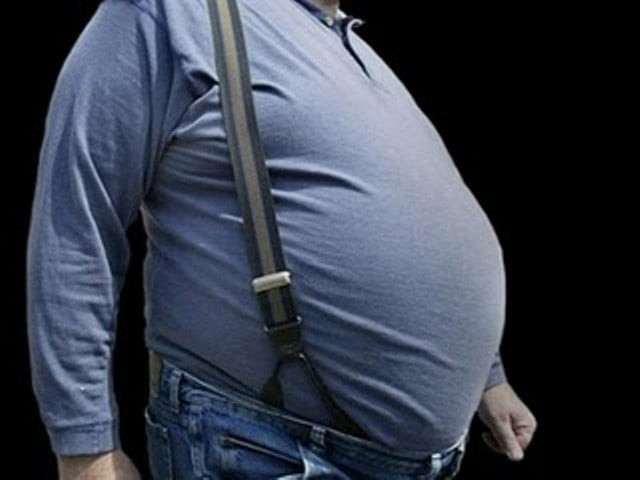Body talk: ‘Every fourth person in Pakistan is obese’
Speakers count oily foods consumption and lack of exercise as key contributors to the problem

Speakers count oily foods consumption and lack of exercise as key contributors to the problem. PHOTO: REUTERS
He was speaking at a session on nutrition awareness at the varsity. According to him, obesity is on the rise in Pakistan as consumption of oily foods and lack of exercise are the norm.
Talking about the body mass index (BMI) cut-off for Asians, he said a BMI greater than 27 indicates obesity while one less than 18.5 hints at malnourishment. He added that BMI between 18.5 and 22.9 is the healthy range for individuals in Asian countries.

According to AKU medicine associate professor Dr Romaina Iqbal, one should be concerned about weight as it is often the root cause of vascular and arthritis diseases. Explaining the relationship of age and weight, she said that the common perception in society is that it is acceptable for an elderly person to be overweight. "Weight has nothing to do with age," she said, adding that it is never appropriate to transgress your ideal BMI range. According to her, one should make it a habit to weigh herself/himself at least once a month.
Iqbal also shared her findings of 2010 on Karachi. "Up to 58 per cent of the men in urban settings in Karachi are obese," she said. "Likewise, the strength of women in the same category is 66 per cent."
Talking about child obesity, AKU Hospital clinical dietician Sidra Raza shared some studies on obese children. "More than 155 million children worldwide are overweight and obese," she said. She stressed the importance of controlling obesity in children as it has a direct impact on their achievement in school. "Children who are obese lack self-esteem and confidence as society tends to reject them," she said.

Nutritionist Dr Mozamila Mughal was of the view that a good diet is essential for good health. According to Mughal, the best diet is one that accommodates all food groups such as bread, fruits, meat, milk and vegetables. "The largest portion of your plate should be vegetables and fruits for maximum vitamins and minerals intake," she said. "The other two small portions should be of meat and carbohydrates which can be taken in the form of rice, grains and lentils." She further said that seasonal fruits should always be taken as their composition of nutrients is such that they are best suited to a particular season.
Published in The Express Tribune, April 30th, 2015.


















COMMENTS
Comments are moderated and generally will be posted if they are on-topic and not abusive.
For more information, please see our Comments FAQ